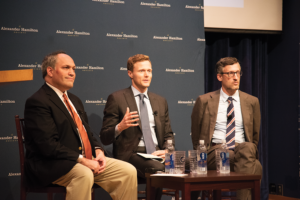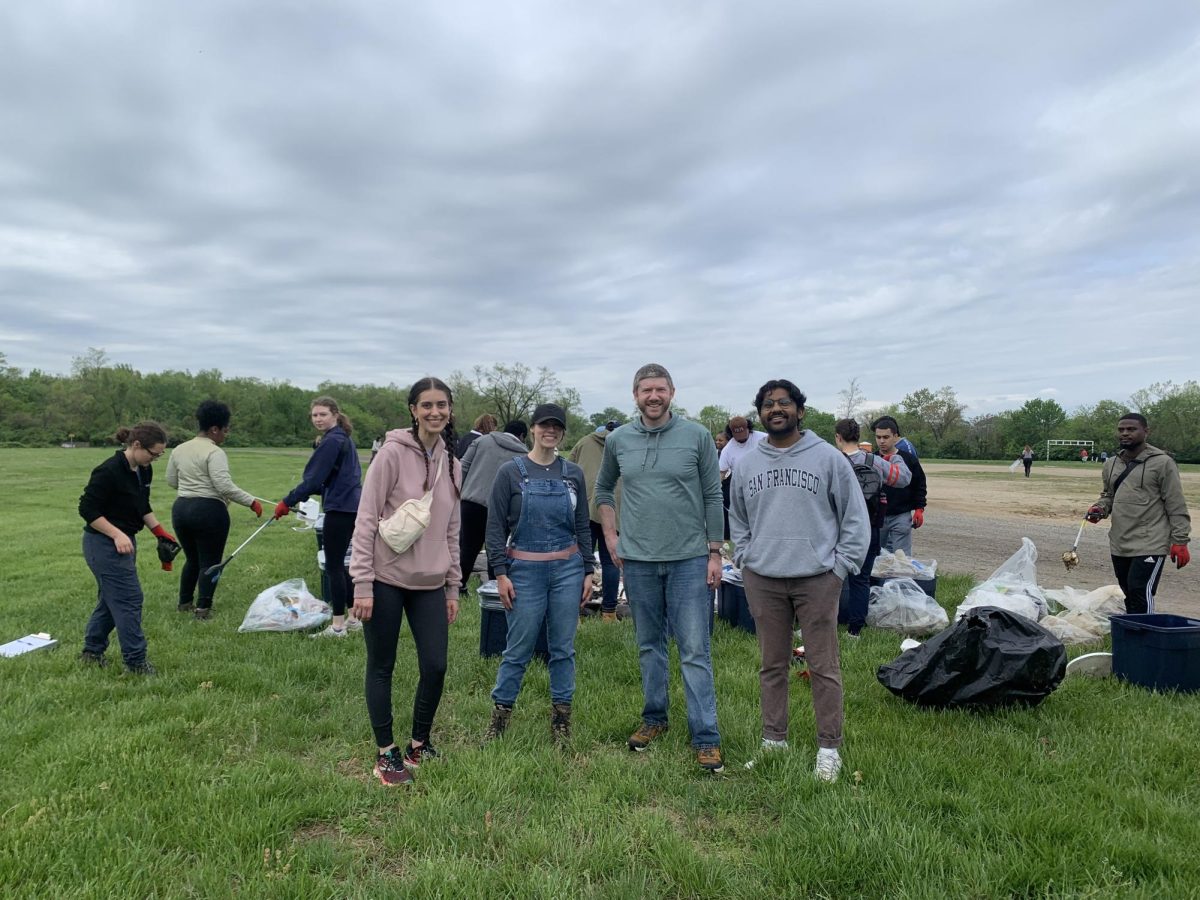
Professor Matthew Kroenig, center, moderated a discussion on nuclear nonproliferation and North Korea between former Pentagon official Michael Rubin, left, and newly appointed Vice Dean of Georgetown College David Edelstein, right, on Wednesday night.
Foreign policy experts hashed out strategies to combat the rise of nuclear proliferation in rogue states, including more aggressive actions against North Korea, at an event hosted by the Alexander Hamilton Society Wednesday evening.
Former Pentagon official Michael Rubin and newly appointed Vice Dean of Georgetown College David Edelstein discussed the successes and failures of previous U.S.-led initiatives and forecasted future possibilities during a panel hosted by government professor Matthew Kroenig.
While the scholars agreed on more fronts than they disagreed, Rubin said the overreliance on diplomacy with rogue states is a culturally misinformed and Western tactic. He suggested that diplomatic measures should be coupled with military options.
“What I want to cast doubt on is this idea that diplomacy always works, and that it never hurts to talk,” Rubin said. “It becomes a mantra among both Democrats and Republicans, yet I would argue that it can be very condescending and culturally insensitive to engage with a sort of mirror-imaging that assumes that everyone approaches diplomacy the same way.”
Edelstein cautioned against the use of military force, emphasizing the limitations of American will in the international arena.
“If the alternative to diplomacy is the use of military force, then we should be reluctant and awfully careful about that alternative. Limited strikes may be able to set back nuclear programs, but at the same time they may only increase the incentive of those states to acquire nuclear weapons,” Edelstein said. “There are limits to even what the world’s most powerful country can accomplish.”
Turning to North Korea’s nuclear program, Rubin and Edelstein made clear that it is not in China’s interests to play the role of watchdog that the United States hopes it will. U.S. foreign policy goals have long focused on preventing North Korea from developing a nuclear warhead able to strike the United States and its allies.
“We thought we would see sincerity from China; we gave them a great deal of incentives in terms of technology and waivers and so forth. Just like the return address for Hezbollah is in Tehran, maybe we have to assume the return address of Pyongyang is in Beijing,” Rubin said.
Edelstein said China continues to benefit from U.S. unwillingness to act on North Korea’s nuclear ambitions.
“Anybody who thinks China is our friend in dealing with North Korea is delusional. The Chinese are quite content to see this issue as a continual thorn in our side,” Edelstein said.
Chinese leaders would only consider a more active role if the regional balance of power were upset, Rubin said.
“I would say we need to talk with Japan, and have the Japanese — who are more concerned about North Korea than even we are — about the possibility of new constitutions, and whether or not, in the spirit of deterrence, maybe it’s time for Japan to reconsider whether it should possess a nuclear weapon,” Rubin said.
Recognizing the instability expected by the emergence of a new nuclear power, Edelstein said a nuclear Japan could bring dangerous, unintended consequences.
“Decades of research show us that the period in which there are new nuclear states is a really dangerous period in international politics,” Edelstein said. “That new state is worried that they may not have many of those things, and it doesn’t yet have the secure second-strike capabilities that we relied on in the Cold War to have that deterrent relationship.”
Rubin suggested regime change should be the end goal of American policy toward North Korea “before the problem gets so much worse.”
The best way to avoid international nuclear conflict would be to rely on deterrence and eschew aggression toward North Korea, Edelstein said.
“My sense is that if [China’s] goal is to keep the regime in power, then the best way to prevent the North Koreans from actually thinking about using these nuclear weapons is by saying, ‘You know what, maybe we just can’t change this regime right now,’” Edelstein said.




















